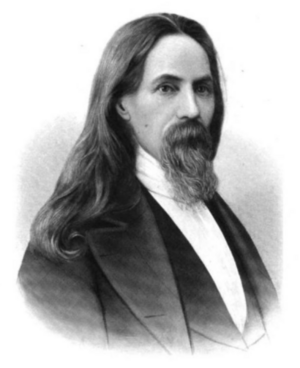D. N. McIntosh facts for kids
Daniel Newnan McIntosh (1822–1896), also known as D. N. McIntosh, was an important leader of the Creek people. He was a farmer, rancher, soldier, and politician. He was the youngest son of William McIntosh, a well-known Creek Chief.
D. N. McIntosh belonged to a very important Creek family. They were leaders of the Lower Creek towns. After his family moved west in 1828, they continued to lead what was called the Western Creek Nation.
During the American Civil War, D. N. McIntosh became a colonel. He formed a group of soldiers called the 1st Creek Mounted Volunteers. He led them in many battles in a place called Indian Territory. After the war, he went back to farming and ranching.
Growing Up
Daniel Newnan McIntosh, or "D.N.", was born on September 20, 1822. He was born in Indian Springs, Georgia. His father was William McIntosh, a famous Creek chief. His mother was Susannah Rowe/Roe.
When Daniel was young, his father was killed in 1825. This happened because his father had sold Creek land without the tribe's permission. After this, Daniel's family moved west in 1828. They settled near the Verdigris River in what was then Indian Territory. This area became known as the Western Creek Nation.
Daniel was sent back East for his education. He studied at Smith's Institute in Kentucky until 1841. Later, D. N. McIntosh moved to an area near Fame. This place is now in McIntosh County, Oklahoma. There, he started a farm and raised cattle. In 1850, he also became a licensed Baptist preacher.
His Family Life
D. N. McIntosh had a very large family. He was married several times and had 20 children. His first wife was Elsie Otterlifter, who was Cherokee. They had two daughters together.
His second wife was Winnie Canard. They had four children together: Ben W. McIntosh, John Cooper McIntosh, Charles E. McIntosh, and Lizzie McIntosh. After Winnie passed away, he married Emma Belle Gawler in 1874. They had eight more children. His many children helped to continue the McIntosh family's important role in the Creek Nation.
Fighting in the Civil War
When the Civil War began, Daniel N. McIntosh quickly became a leader. He organized a group of soldiers called the 1st Creek Mounted Volunteers. He served as their Colonel in the Confederate States Army. His older brother, Chilly McIntosh, also led a group called the 2nd Creek Mounted Volunteers.
D.N. McIntosh was planning to form a third Creek cavalry group. If he had, he would have become a Brigadier General. However, the war ended before this could happen. Eight members of the McIntosh family fought in Daniel's regiment.
His soldiers fought in many important battles. These included Round Mountain, Chusto-Talasah, and Honey Springs. Colonel McIntosh's regiment was one of the last Confederate groups to surrender. They gave up on June 23, 1865.
Life After the War
After the Civil War, D. N. McIntosh continued to serve his people. He helped represent the Creek Nation in important talks. He signed the Creek Treaty of 1866. The United States wanted a new peace treaty because the Creek Nation had sided with the Confederacy.
This treaty was very important. It said that the Creek Nation had to free all enslaved people. It also offered these freed people full membership and rights within the Creek tribe. This included getting shares of land.
McIntosh often traveled to Washington, D.C., to represent the Creek Nation. He became a very successful farmer and rancher. During his life, he held almost every important job in the Creek tribe. He was a respected leader until his death.
D. N. McIntosh passed away on April 10, 1895. He died at his farm near Fame, in Indian Territory. He was buried at Fame Cemetery, which is now part of McIntosh County, Oklahoma.
 | Frances Mary Albrier |
 | Whitney Young |
 | Muhammad Ali |


